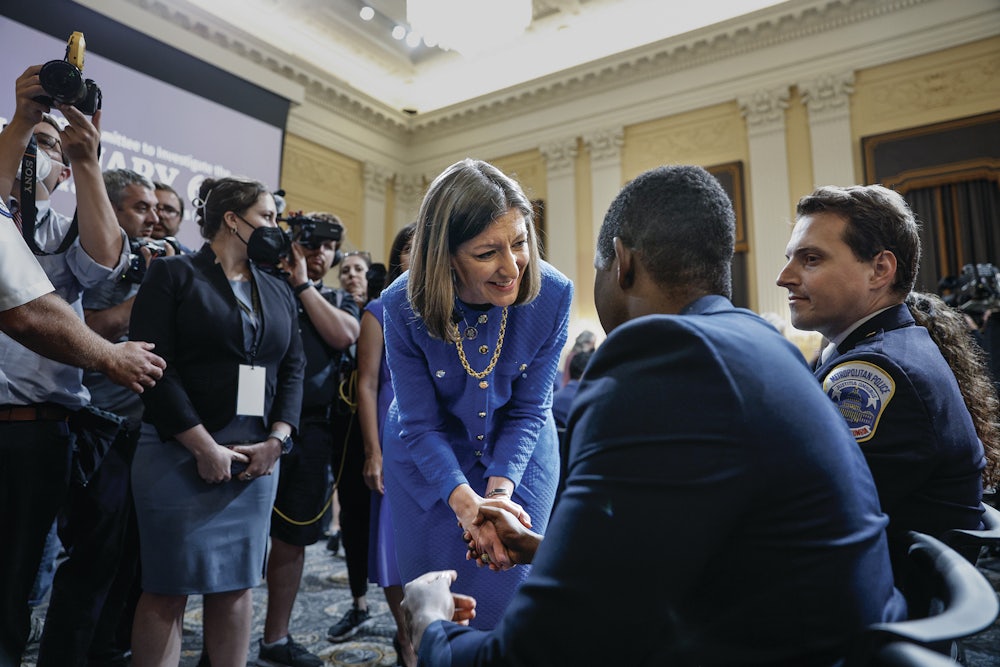It was the kind of small-town Fourth of July parade that was only missing Norman Rockwell painting it for a Saturday Evening Post cover. The scene in Cape Charles, Virginia, a beach community near the south end of the Delmarva Peninsula, featured nine venerable members of the American Legion at the head of the parade; a high school marching band playing a slightly off-key rendition of the “Battle Hymn of the Republic”; and a star-spangled symphony of small U.S. flags.
Behind a banner for the Northampton County Democratic Party, two-term U.S. Representative Elaine Luria and her daughter Violette sat at the back of a golf cart gleefully tossing candy to the crowd along Mason Avenue. From the sidewalk, Fitzhugh Godwin, an attorney in nearby Onancock, shouted, “You’ve got my vote.” Explaining his enthusiasm, Godwin stressed Luria’s service on the House committee investigating the January 6 insurrection and her spot on the Armed Services Committee. The parade had a festive air devoid of politics, one of an old-fashioned America where political differences could be resolved over an ice-cold glass of sarsaparilla down at the drugstore. Cape Charles (population: 1,245) seemed a century away from the violent mob ransacking the Capitol last year.
An hour later, sitting on the porch of a supporter’s home in Cape Charles, I asked Luria about the discrepancy between the understated sense of unity at the parade and the bitter divisiveness of U.S. politics. A former Navy commander with a Naval Academy ring visible on her finger, Luria replied in her characteristic soft voice, “I just feel like a lot of division and political turmoil that you might see turning on the TV ... just doesn’t permeate here in the same way.” Talking proudly of her district (VA-2), centered in Virginia Beach in the southeastern corner of the state, Luria added, “The only time I think that really nasty political division comes up is election time when people feel they need to score some points.”
Luria’s seat is about the most evenly divided in the country. Based on its partisan voting history, the Cook Political Report rates Virginia’s 2nd District as just a hair more Republican than Democratic—224th out of the nation’s 435 House districts. Using the 2020 presidential vote as a barometer, Kyle Kondik from Sabato’s Crystal Ball at the University of Virginia calls it the median congressional district in the country. Joe Biden won with 50 percent of the vote, but Republican Glenn Youngkin swept it by a double-digit margin in the 2021 gubernatorial race. Referring to Luria’s reelection fight in this ultimate swing district, a top Democratic strategist said, “It’s a race that could be decided by 500 votes.”
“Virginia Beach is a very peculiar place,” said Bill Curtis, chairman of the Republican Party of Virginia Beach, the city that makes up about three-fifths of the district’s voters. “We’re very cosmopolitan. There is a heavy military presence here. And a lot of people have moved here from up North. We’re mostly a moderate area.” Or as Ben Tribbett, who has been a consultant for Luria, put it, “This is a congressional district that’s unlike any in the country—that military presence gives it a different vibe.” The Hampton Roads area, which includes Virginia Beach, is dotted with naval bases. The standard calculus is that one-fifth of the district’s voters are active-duty military and veterans. But the Luria campaign estimates that the number might be as high as 50 percent when you throw in military families and those employed by defense contractors.
Rather than run as just a cookie-cutter moderate Dem who supports the troops, Luria has taken a bold risk as she seeks a third term in office. Luria is the only endangered Democrat on the January 6 committee, and is poised to make her race a referendum on the future of democracy. In her first TV ad, Luria declared, “This is about our democracy. It’s not about retaining power in the House or a potential reelection.” She echoed that sentiment when I spoke to her: “I truly feel it’s more important to do the right thing and be on the right side of history. And if it were to mean that I didn’t get reelected in 2022 because of this, I would be OK with that and able to sleep at night. I know I’ve done the right thing.”
Since she was 17 years old, growing up in a comfortable Jewish family in Birmingham, Alabama, Luria has made unorthodox choices. Instead of attending Columbia, her initial college choice, a summer science program at Annapolis prompted her, as she put it, to fall in love “with the Naval Academy and the idea of being an officer in the Navy.” Her timing was impeccable: While she was a student, the statutory ban on women serving in combat was lifted. Soon after graduation, she became a surface warfare officer. By the end of her 20-year naval career in 2017, she had commanded an assault ship plying the Persian Gulf in search of Iranian vessels.
Before she left the Navy, Luria and her husband, Robert Blondin, also a retired Navy commander, had started a souvenir business in Norfolk (since sold) called the Mermaid Factory, where tourists paint molds of mermaids. As late as 2016, Luria was apolitical enough to have voted for Republican Representative Scott Taylor. But when she declared for Congress in January 2018, she was immediately embraced by national Democrats entranced by her military record. With Taylor battered by a scandal over fraudulent petition signatures, Luria won an upset victory by 6,000 votes.
As soft-spoken as Luria is, you never completely forget her military background. “She has two speeds,” said Andria McClellan, a friend and member of the Norfolk City Council. “There’s the quiet, humble speed and the take-charge leader speed. It’s jarring to watch her go from one to the other.”
She’ll need that other gear for her difficult reelection campaign this year. Jen Kiggans, the GOP nominee, is a former Navy helicopter pilot with a son at the Naval Academy. Jay Jones, a former delegate in the Virginia legislature and a Luria friend, who knows Kiggans from Richmond, said, “In a lot of ways, she’s a mirror image of Elaine.” Elected to the state Senate from Virginia Beach in 2019, Kiggans began as a centrist who emphasized a “return to normalcy” and “civility.” Her announcement video for Congress in April 2021 was a bland bio spot showing her wearing both a pilot’s leather jacket and a white coat and carrying a stethoscope in her job as a geriatric nurse practitioner. While there were obligatory jabs at the “cancel culture” and “liberal one-party rule” in Washington, the video ends with Kiggans declaring a bit incoherently, “I am urging all normal people with the courage to fight to forget about politics and join me.”
But faced with a GOP primary against mega-MAGA Trump supporters, Kiggans veered sharply to the right. In February, she was one of just four Republicans in the state Senate to vote for a baseless $70 million 2020 election audit in Virginia, a state that Biden carried by nearly 500,000 votes. Even after she won the June 21 primary by a two-to-one margin over her nearest rival, Jarome Bell, Kiggans wouldn’t directly acknowledge that Biden won the 2020 election. And in a July interview with right-wing radio host John Fredericks, Kiggans expressed her willingness to shut down the government in Congress to build Trump’s wall. None of that has been enough for Bell, who has refused to endorse Kiggans. “I call her Luria Lite,” he told me in an interview. “She pretends to be a conservative, but she’s really a moderate.”
Unlike almost all endangered incumbents, Luria has regarded politics as secondary during the first half of this year. Instead, she’s been understandably preoccupied with her day job—documenting Trump’s role in directing a coup attempt to overturn the 2020 election. On a typical workday over the Fourth of July congressional recess, Luria was up at 5 a.m. in her home office and reading depositions, and by 7 she was on the phone with staffers to analyze testimony. “That’s pretty typical,” her husband said, “even on the weekends.”
Rather than shying away from the time-draining and divisive assignment, Luria, the most junior member on the committee, vied for the appointment from Nancy Pelosi. “She actively sought the opportunity, but she also knew the risk in doing so,” said her friend McClellan. According to Luria’s husband, neither of them had any doubts that she should serve. “I thought it was important to have a mix of members that had backgrounds like Elaine’s,” he said.
Luria was seen but not heard during the first seven hearings of the committee. Then she took center stage on July 21, the last public session until September. Along with Republican Adam Kinzinger, another veteran, Luria detailed Trump’s paralysis during 187 minutes as rioters rampaged through the Capitol. “This is not, as it may appear, a story of inaction in time of crisis,” she insisted in an understated, but powerful, closing statement. “But instead, it was the final action of Donald Trump’s own plan to usurp the will of the American people and remain in power.”
During that July prime-time hearing, Luria received more national television exposure than many veteran legislators get in an entire career. She may be most remembered for her artful—and hopefully permanent—put-down of Missouri GOP Senator Josh Hawley. Luria contrasted his raised-fist support for the demonstrators at the Capitol from safety behind police barricades with later video of Hawley sprinting from danger as the insurrectionists he’d encouraged headed for the Senate floor.
Since she was named to the committee in late June 2021, Luria—who was born the year after Richard Nixon resigned—has turned herself into a Watergate scholar. She has watched many of the 237 hours of testimony before the Senate Watergate committee chaired by Sam Ervin. Her home, a Spanish-style 1950s stucco house on a quiet block in Norfolk, is littered with Watergate books. The dark, wooden, built-in bookshelves, constructed by Luria and her husband, not only have the obvious (John Dean’s Blind Ambition and Ervin’s autobiography), but also have more obscure works such as At That Point in Time by Fred Thompson, the committee’s Republican counsel who later became a Tennessee senator. In a drawer filled with books, there is a copy of James Madison’s notes on the 1787 Constitutional Convention, punctuated by Luria with numerous Post-its. The house, where the once-nomadic Navy couple have lived since 2005, has other surprises, from the modern kitchen that they both built to a sewing machine on the dining room table where Luria is creating a cosplay outfit for her daughter.

This comfortable but far from lavish house comes with a geographic problem. Redistricting removed all of Norfolk from the 2nd District, while adding a Republican tilt. As we sat on a back patio, I asked Blondin what they would do if Luria were reelected. “We’re trying to figure that out right now,” he said, before adding with a bit of a sigh, “But you know, if that’s what’s required.”
Democratic moderates are often portrayed by the left as timorous figures reluctant to take strong stands for fear of political retribution. But, in contrast to many in Congress, Luria seems to be the genuine article. She has consistently broken with the Biden administration over military spending, especially for the Navy. “I got $37 billion this year, and $25 billion last year, added to the defense budget because I was quite disappointed in the administration’s submission,” Luria told me.
Luria is an ardent proponent of sea power. She worries “that we have allowed China to surpass us.” Her hawkish attitudes toward China lead Luria to somewhat downplay the far-reaching strategic implications of Russia’s ground assault against Ukraine. “A permanent, longer-term increased commitment in Europe is going to further weaken us vis-à-vis China and our ability to have a presence in the Pacific,” she said. Luria even expressed a bit of skepticism about admitting Sweden and Finland into NATO. “We just need to be cautious in terms of incurring additional commitments,” she said.
Luria displays a throwback, Biden-esque belief in bipartisanship based on both her service on Armed Services and the Virginia congressional delegation’s tradition of holding monthly meetings with Democrats and Republicans. Luria said that she recently asked John Lehman, the secretary of the Navy under Ronald Reagan, “How did you get the entire country, from the president on down, behind the idea of what we needed to do in order to defeat the Soviet Union?” The nostalgic belief that there was national unity over the Reagan defense buildup would have been a shock to liberal Democrats during the 1980s. Luria also bonded with Liz Cheney on Armed Services, long before the January 6 committee. “I have really always liked and respected her,” Luria said, “even though on issues we’re at a very different place.”
Most congressional Democrats will drop almost any topic to talk about the dire implications of the Supreme Court overturning Roe v. Wade. But on this, too, Luria is different, even though she unequivocally supports abortion rights. When asked about the political implications of abortion and other social issues, Luria replied with palpable reluctance, “We’ll have to see how important those issues are. I’ve never in two campaigns ... spoken about abortion as an issue, or choice as an issue.”
A half-century ago (during the heyday of Tip O’Neill’s dictum: “All politics is local”), members of Congress were largely reelected on the projects and pork that they brought back to the district rather than ideology. In an era of nationalized politics, that idea now seems as quaint as the 1970s CB radio craze. But Luria and her campaign team believe that this election is about her rather than the national political environment. “I’m certainly the only Democrat who’s going to focus in my campaign on the fact that I got $37 billion added to the defense budget,” she stressed. “You know, most of my peers would have run away from that.”
National Democratic strategists worry that one aspect of Luria’s political record may provide fodder for GOP attack ads. In an interview with Punchbowl News in February, Luria ridiculed as “bullshit” a proposal by Democratic Representative Abigail Spanberger of Virginia to ban congressional stock trades. Luria, who actively trades stocks in her retirement account, argued, “The people that you’re electing to represent you, it makes no sense that you’re going to automatically assume that they’re going to use their position for some nefarious means or to benefit themselves.”
Republicans make no secret of their intention to nationalize the Kiggans-Luria race. Before this campaign is over, voters in the 2nd District may, through GOP repetition, come to assume that it’s the “Biden-Luria” administration in Washington. Asked about the effect of the January 6 committee on the election, Dennis Free, chairman of the GOP committee in the 2nd District, said, “I think it will hurt Ms. Luria because she’s concentrating on things that don’t concern the country.” In Free’s telling, it’s all about inflation and immigration—and not about the first coup attempt since the Civil War.
“She’s a politician of the current era who could probably fit in an earlier era,” Jay Jones said. “She could have served on the Church Committee or Watergate.” In a sense, there is a knowing innocence about Luria. Not, in any way, weakness—she used to command ships. But rather a steadfast faith that America’s better angels can still be summoned. “If there can’t be some future rebirth of the Republican Party down the road, then I am fearful for our institutions,” Luria said as we spoke on the Fourth of July. “So I am not going to shy away from talking about that.... It is the most terrifying thing to me. And I would feel like I was being negligent or something if I didn’t talk about it.”






